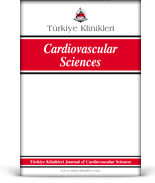Objective: The aim of this study was to examine the effect of preprocedural anxiety levels on developing complications and the effect of anxiety on perioperative vital parameters in patients scheduled for coronary angiography. Material and Methods: The study included 150 patients who were admitted to the cardiology outpatient clinic with chest pain and/or any complaints and who were indicated for coronary angiography for the first time as a result of examinations. Anxiety scores were evaluated using the Hamilton Anxiety Rating Scale. Increased blood pressure (>180/100 mmHg), increased heart rate (<120/min), hemodynamic collapse, vagotonia, hemorrhage and hematoma during and after the procedure were evaluated as complications. The patients were divided into two groups as Group 1 including 38 patients, the group with complications (27M; mean age 61.8±14.0 years), and Group 2 including 112 patients, the group without complications (69M; mean age 61.2±12.1years), according to whether or not complications developed. Results: Hamilton anxiety scores and procedure periods were significantly higher in Group 1 compared to Group 2. Blood pressures before and during the procedure and heart rates after the procedure were significantly higher in Group 1 compared to Group 2. Anxiety scores were significantly correlated with waiting periods and procedure periods. Anxiety scores were also significantly correlated with heart rates before and after the procedure. Conclusion: Anxiety scores were significantly higher in patients with complications. Effective anxiety treatment in patients whose preprocedural anxiety scores higher should be determined.
Keywords: Anxiety; complication; coronary angiography
Amaç: Çalışmamızın amacı, koroner anjiyografi uygulanması planlanan hastalarda işlem öncesi anksiyete düzeylerinin gelişen komplikasyonlar üzerine etkisi ve anksiyetenin perioperatif vital parametrelere etkisinin incelenmesidir. Gereç ve Yöntemler: Çalışmaya göğüs ağrısı ve/veya herhangi bir şikayetle kardiyoloji polikliniğine başvuran ve yapılan incelemeler ve tetkikler neticesinde ilk defa koroner anjiyografi endikasyonu konulan 150 hasta dahil edilmiştir. Anksiyete skorları Hamilton anksiyete değerlendirme ölçegi ile değerlendirildi. Hastaların işlem öncesi bekleme süreleri, işlem süresi, işlem öncesi, sırasında ve sonrasında kan basınçları ile kalp hızları kaydedildi. İşlem esnasında ve sonrasında, kan basıncının yükselmesi (>180/100 mmHg), kalp hızının yükselmesi (<120/dk), hemodinamik kollaps, vagotoni gelişmesi, kanama, hematom gelişimi komplikasyon olarak değerlendirildi. Komplikasyon gelişip gelişmemesine göre hastalar 2 gruba ayrıldı; Grup 1; 38 hasta, komplikasyon gelişmiş grup (27 E; ortalama yaş. 61,8±14,0 yıl), Grup 2; 112 hasta, komplikasyon gelişmemiş grup (69 E; ortalama yaş 61,2±12,1yıl). Bulgular: Hamilton anksiyete skorları ile işlem süreleri Grup 1?de Grup 2?ye göre anlamlı olarak yüksekti. İşlem öncesi ve işlem esnasındaki kan basınçları ile işlem sonrası kalp hızları Grup 1?de Grup 2?ye göre anlamlı olarak yüksekti. İşlem sonrası kan basınçları ile kalp hızları ise benzerdi Anksiyete skorları bekleme süreleri ve işlem süreleri ile anlamlı şekilde korele idi. Anksiyete skorları yine işlem öncesi ve sonrası kalp hızları ile anlamlı şekilde korelasyon göstermekteydi. Sonuç: Komplikasyon gelişen hastalarda anksiyete skorları belirgin derece yüksektir. İşlem öncesi anksiyete skoru belirlenen ve yüksek bulunan hastalarda etkin anksiyete tedavisi uygulanmalıdır.
Anahtar Kelimeler: Anksiyete; komplikasyon; koroner anjiyografi
- Buonanno P, Laiola A, Palumbo C, Spinelli G, Terminiello V, Servillo G. Italian validation of the Amsterdam preoperative anxiety and information scale. Minerva Anestesiol. 2017;83(7):705-11.
- Pokharel K, Bhattarai B, Tripathi M, Khatiwada S, Subedi A. Nepalese patients' anxiety and concerns before surgery. J Clin Anesth. 2011;23(5):372-8. [Crossref] [PubMed]
- Maranets I, Kain ZN. Preoperative anxiety and intraoperative anesthetic requirements. Anesth Analg. 1999;89(6):1346-51. [Crossref]
- Van Den Bosch JE, Moons KG, Bonsel GJ, Kalkman CJ. Does measurement of preoperative anxiety have added value for predicting postoperative nausea and vomiting? Anesth Analg. 2005;100(5):1525-32. [Crossref] [PubMed]
- Mohd Fahmi Z, Lai LL, Loh PS. Validation of the Malay version of the Amsterdam preoperative anxiety and information scale (APAIS). Med J Malaysia. 2015;70(4):243-8.
- Moerman N, van Dam FS, Muller MJ, Oosting H. The Amsterdam preoperative anxiety and information scale (APAIS). Anesth Analg. 1996;82(3):445-51. [Crossref]
- Blumenthal JA, Lett HS, Babyak MA, White W, Smith PK, Mark DB, et al. Depression as a risk factor for mortality after coronary artery bypass surgery. Lancet. 2003;362(9384):604-9. [Crossref]
- Watkins LL, Blumenthal JA, Carney RM. Association of anxiety with reduced baroreflex cardiac control in patients after acute myocardial infarction. Am Heart J. 2002;143(3):460-6. [Crossref] [PubMed]
- Hamilton M. The assessment of anxiety states by rating. Br J Med Psychol. 1959;32(1):50-5. [Crossref] [PubMed]
- Yazıcı MK, Demir B, Tanrıverdi N, Karaağaoğlu E, Yolaç P. [Hamilton anxiety rating scale: interrater reliability and validity study]. Turk Psikiyatri Dergisi. 1998;9(2):114-7.
- Gross C, Hen R. The developmental origins of anxiety. Nat Rev Neurosci. 2004;5(7):545-52. [Crossref] [PubMed]
- Moser DK, Dracup K, Evangelista LS, Zambroski CH, Lennie TA, Chung ML, et al. Comparison of prevalence of symptoms of depression, anxiety, and hostility in elderly patients with heart failure, myocardial infarction, and a coronary artery bypass graft. Heart Lung. 2010;39(5):378-85. [Crossref] [PubMed] [PMC]
- Musselman DL, Evans DL, Nemeroff CB. The relationship of depression to cardiovascular disease: epidemiology, biology, and treatment. Arch Gen Psychiatry. 1998;55(7):580-92. [Crossref] [PubMed]
- Grace SL, Abbey SE, Irvine J, Shnek ZM, Stewart DE. Prospective examination of anxiety persistence and its relationship to cardiac symptoms and recurrent cardiac events. Psychother Psychosom. 2004;73(6):344-52. [Crossref] [PubMed]
- Barger SD, Sydeman SJ. Does generalized anxiety disorder predict coronary heart disease risk factors independently of major depressive disorder? J Affect Disord. 2005;88(1):87-91. [Crossref] [PubMed]
- Koivula M, Tarkka MT, Tarkka M, Laippala P, Paunonen- Ilmonen M. Fear and anxiety in patients at different timepoints in the coronary artery bypass process. Int J Nurs Stud. 2002;39(8):811-22. [Crossref]
- Nekouei ZK, Yousefy A, Manshaee G, Nikneshan S. Comparing anxiety in cardiac patients candidate for angiography with normal population. ARYA Atheroscler. 2011;7(3):93-6.
- Delewi R, Vlastra W, Rohling WJ, Wagenaar TC, Zwenstra M, Meesterman MG, et al. Anxiety levels of patients undergoing coronary procedures in the catheterization laboratory. Int J Cardiol. 2017;228:926-30. [Crossref] [PubMed]
- Adib Hajbaghery M, Moradi T, Mohseni R. Effects of a multimodal preparation package on vital signs of patients waiting for coronary angiography. Nurs Midwifery Stud. 2014;3(1):e17518. [Crossref]
- Majidi S. Recitation effect of holy Quran on anxiety of patients before undergoing coronary artery angiography. Journal of Guilan University of Medical Sciences. 2004;13(49): 61-7.







.: Process List